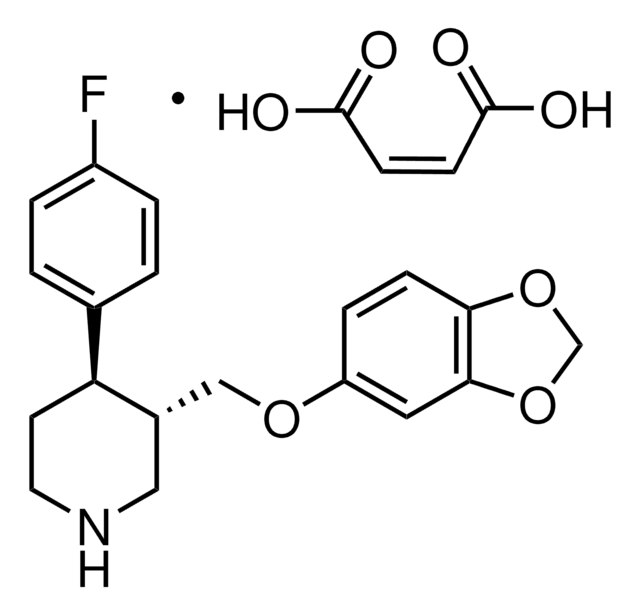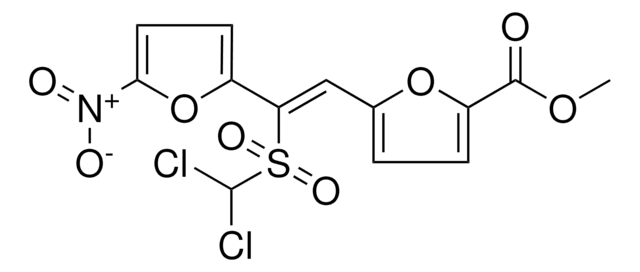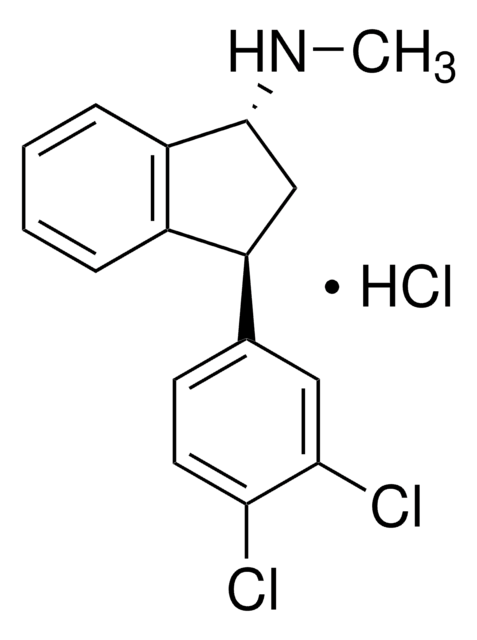P9623
Paroxetine hydrochloride hemihydrate
≥98% (HPLC), powder, serotonin reuptake inhibitor
Synonym(s):
Paroxetine HCl, (3S-trans)-3-[(1,3-Benzodioxol-5-yloxy)methyl]-4-(4-fluorophenyl)piperidine hydrochloride hemihydrate
About This Item
Recommended Products
product name
Paroxetine hydrochloride hemihydrate, ≥98% (HPLC), powder
Quality Level
Assay
≥98% (HPLC)
form
powder
storage condition
desiccated
color
white
originator
GlaxoSmithKline
SMILES string
O.Cl[H].Fc1ccc(cc1)[C@@H]2CCNC[C@H]2COc3ccc4OCOc4c3
InChI
1S/C19H20FNO3.ClH.H2O/c20-15-3-1-13(2-4-15)17-7-8-21-10-14(17)11-22-16-5-6-18-19(9-16)24-12-23-18;;/h1-6,9,14,17,21H,7-8,10-12H2;1H;1H2/t14-,17-;;/m0../s1
InChI key
QRQSGFFISBKLMZ-YHOFXEKLSA-N
Gene Information
human ... SLC6A4(6532)
Looking for similar products? Visit Product Comparison Guide
Application
Biochem/physiol Actions
Features and Benefits
Legal Information
Signal Word
Warning
Hazard Statements
Precautionary Statements
Hazard Classifications
Acute Tox. 4 Oral - Aquatic Acute 1 - Aquatic Chronic 1 - Eye Irrit. 2 - Skin Sens. 1 - STOT SE 3
Target Organs
Respiratory system
Storage Class Code
11 - Combustible Solids
WGK
WGK 3
Flash Point(F)
Not applicable
Flash Point(C)
Not applicable
Personal Protective Equipment
Certificates of Analysis (COA)
Search for Certificates of Analysis (COA) by entering the products Lot/Batch Number. Lot and Batch Numbers can be found on a product’s label following the words ‘Lot’ or ‘Batch’.
Already Own This Product?
Find documentation for the products that you have recently purchased in the Document Library.
Customers Also Viewed
Our team of scientists has experience in all areas of research including Life Science, Material Science, Chemical Synthesis, Chromatography, Analytical and many others.
Contact Technical Service


















